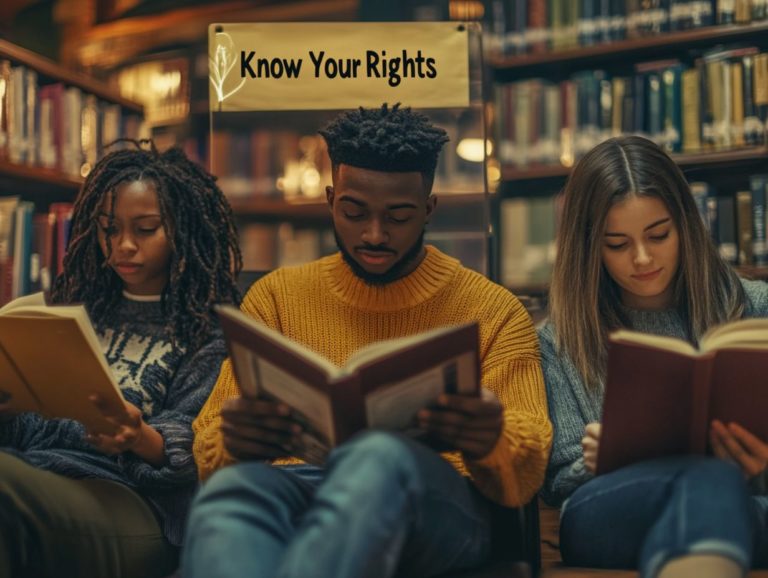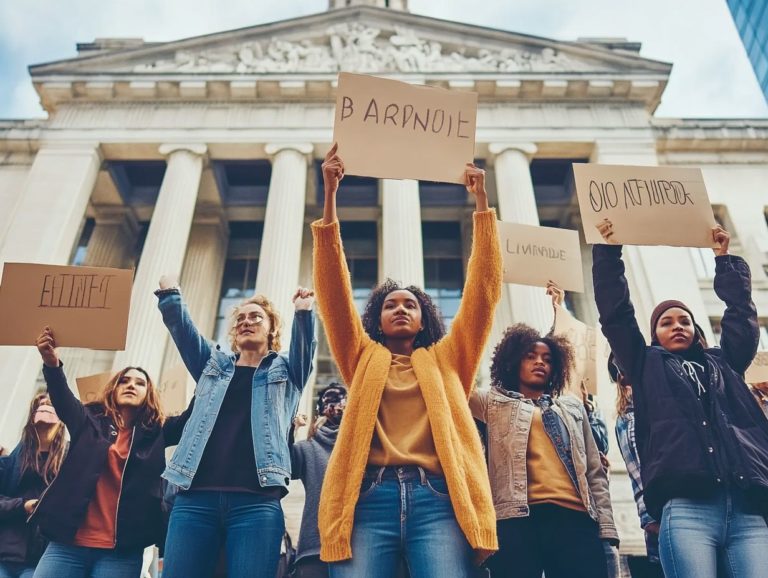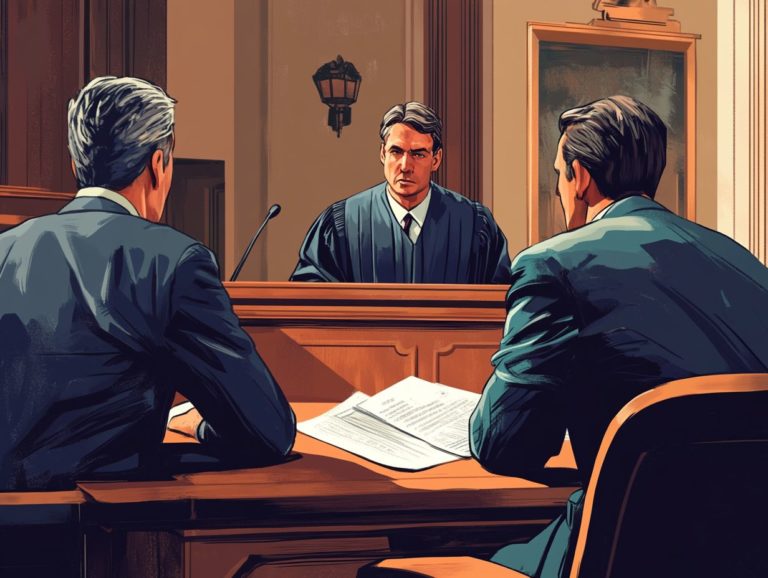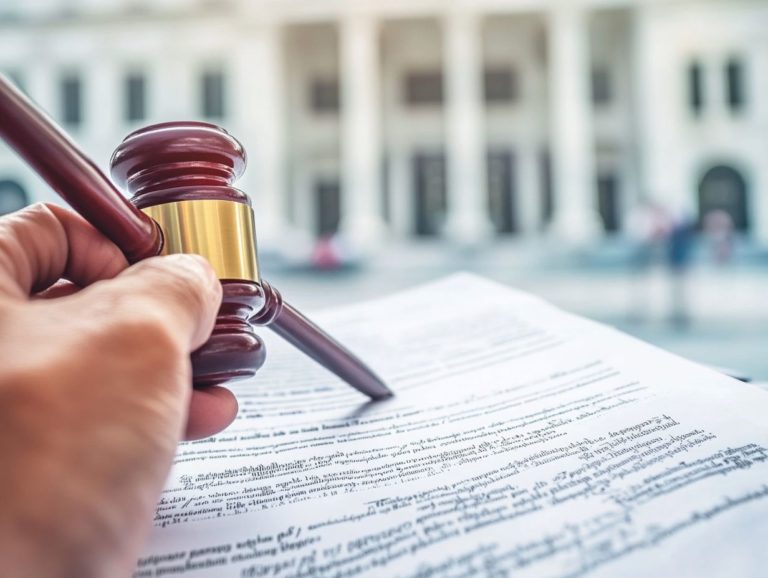The Role of Jury Nullification in Rights
Jury nullification is a powerful yet often misunderstood facet of the legal system. It allows juries to acquit a defendant, even in the face of compelling evidence of guilt, if they are driven by moral or ethical convictions.
This article explores the definition and history of jury nullification. We will examine its essential role as a check on governmental authority and the controversies it ignites in both legal and ethical spheres.
You will discover landmark cases that shape this practice. We will also discuss practical steps jurors can take while contemplating its future implications.
Join us as we unpack this captivating topic at the intersection of justice and personal belief!
Contents
- Key Takeaways:
- Understanding Jury Nullification
- The Role of Jury Nullification in the Justice System
- Controversies Surrounding Jury Nullification
- Examples of Jury Nullification in Action
- How to Use Jury Nullification
- The Future of Jury Nullification
- Frequently Asked Questions
- How does jury nullification empower jurors to protect rights?
- How does jury nullification impact the legal system?
- Are jurors informed about their power of nullification?
- What are the potential drawbacks of jury nullification?
- Can jury nullification be used in all types of cases?
- Does jury nullification protect the rights of the majority or the minority?
Key Takeaways:
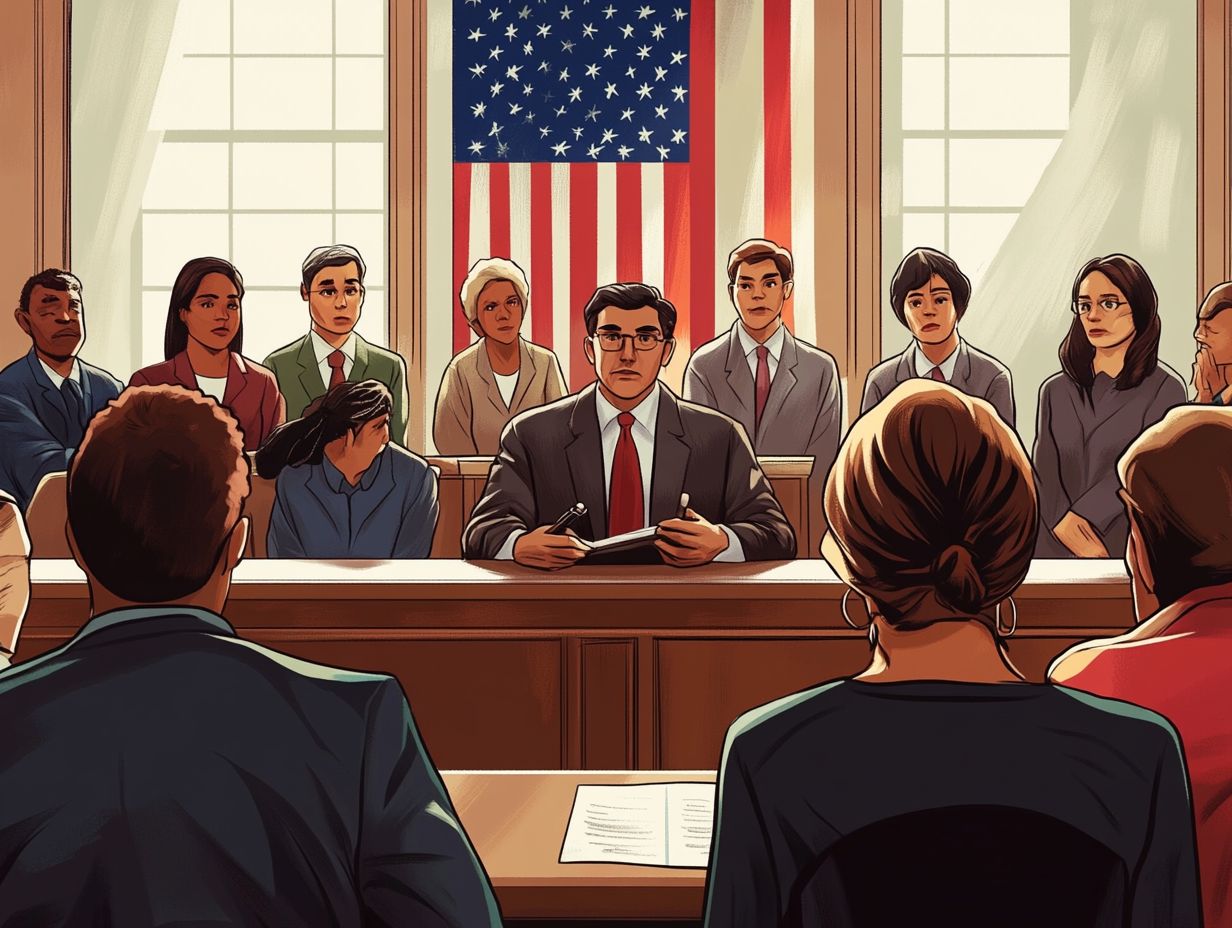
Jury nullification is the power of a jury to acquit a defendant, even when the evidence suggests guilt, if they believe the law is unjust or not applicable to the case.
This practice serves as a crucial check and balance on government power, ensuring that individual rights are protected and the justice system remains fair.
Jury nullification is a controversial issue with ethical and legal considerations that must be taken into account. It has the potential to bring about significant changes to the justice system in the future.
Understanding Jury Nullification
Jury nullification is a fascinating legal concept that originates from the study of law in America. It grants jurors the right to dismiss a law they deem unjust, regardless of the evidence presented.
This practice is steeped in the history of colonial America. It remains deeply intertwined with contemporary social issues regarding morality and fairness within the legal system.
To fully grasp jury nullification, one must explore its historical roots and consider its ethical implications. It is crucial to assess its effects on the criminal justice system, where jurors can deliver a not guilty verdict, even when the law has technically been violated.
Definition and History
The concept of jury nullification has its roots in colonial America. Jurors wielded the power to make decisions based on their own sense of justice, embodying the values and moral standards of their society.
This practice emerged as a powerful tool for ordinary citizens, allowing them to challenge laws they considered unjust or oppressive.
One notable example occurred during the enforcement of the Fugitive Slave Clause, which required the return of runaway enslaved individuals to their owners. In these cases, jurors often chose to acquit defendants charged under this clause, prioritizing their moral beliefs over the rigid dictates of the law.
These decisions showcased the jurors’ courage in confronting institutionalized injustice. They highlighted the dynamic interplay between legal frameworks and societal ethics throughout American history.
The Role of Jury Nullification in the Justice System
The role of jury nullification in the justice system is vital. It acts as a safeguard against government overreach, granting you the power to exercise discretion in cases where the law may lead to unjust outcomes, especially when using jury nullification as a defense.
By opting for a thoughtful decision to find someone not guilty, you can challenge prosecutorial overreach and uphold a sense of justice that aligns with society’s moral values.
This practice reinforces the balance of power between the government and the people. It affirms your essential role in maintaining the integrity of the legal system.
Checks and Balances on Government Power
Jury nullification serves as a crucial check on government power. It allows you, as a juror, to safeguard against laws that may seem unjust or tyrannical.
This unique feature of the legal system gives you the power to critically assess the morality and implications of laws in the context of specific cases.
By acting as a buffer against potential abuses of authority, it reinforces the idea that justice should be both blind and equitable.
When you exercise your discretion to challenge the validity of government statutes, you affirm your essential role in democracy. You protect individual rights and stand firm against oppressive measures.
Ultimately, this practice cultivates a more accountable system, urging lawmakers to be diligent in crafting fair and just legislation.
Controversies Surrounding Jury Nullification
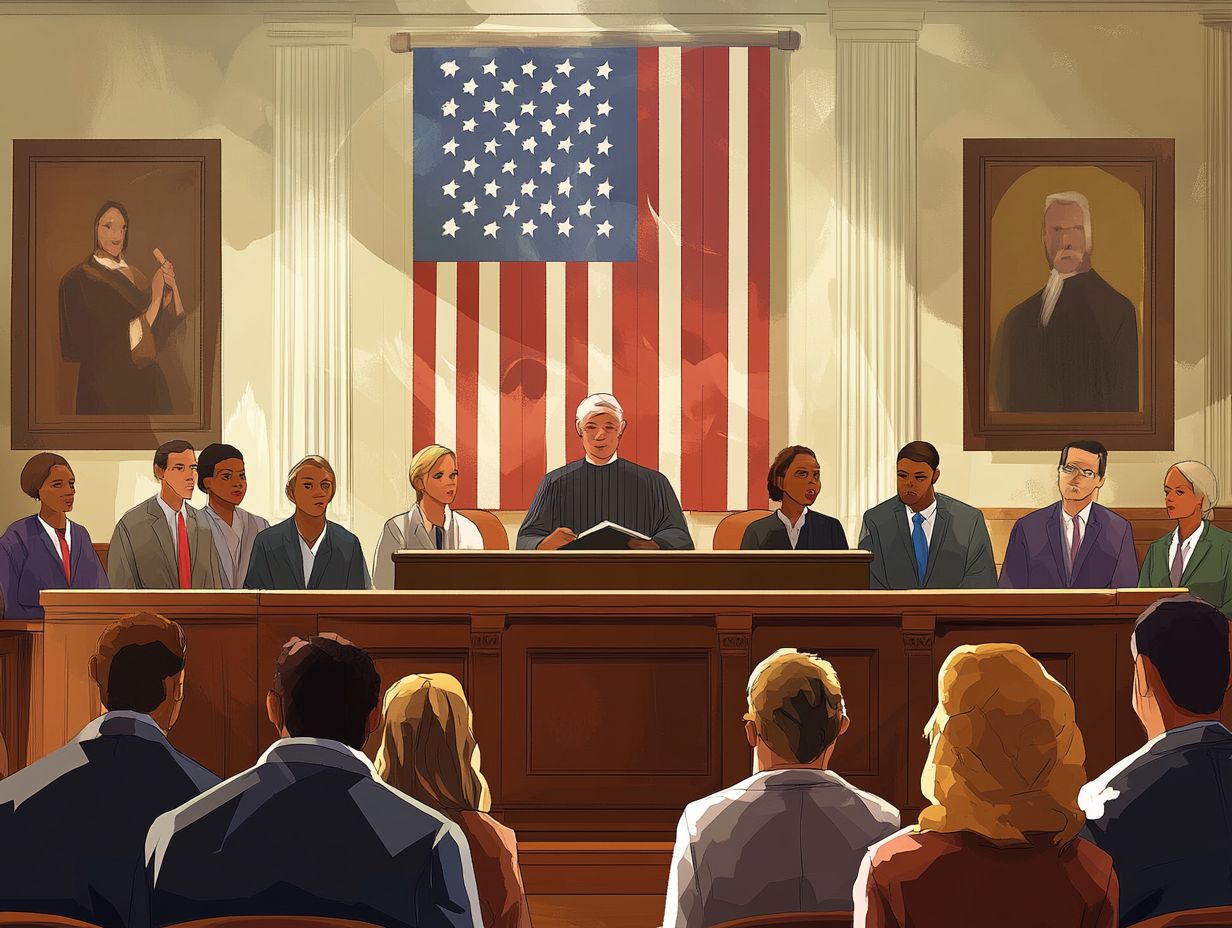
Controversies surrounding jury nullification present complex ethical and legal implications. These challenges question the very foundation of the judicial process.
Perverse verdicts and jury tampering are significant threats to judicial integrity. Such issues can leave you grappling with serious concerns.
Critics contend that this practice undermines legal consistency. Proponents argue it is vital for delivering justice in cases plagued by unjust laws or oppressive government actions.
Ethical and Legal Considerations
Ethical and legal considerations surrounding jury nullification reveal the intricate tension between personal morality and the enforcement of laws. This prompts you to ponder essential questions about justice and fairness.
As jurors navigate their responsibilities, you may confront dilemmas where personal beliefs clash with established laws. This often reveals a gap between community values and legal strictness.
The implications for defendants are substantial. When jurors choose to exercise their discretion based on conscience rather than evidence, the stakes for defendants are incredibly high!
This delicate balance tests the foundations of the judicial system. It also ignites debates about whether such acts of defiance enhance or erode confidence in legal institutions.
Ultimately, the consequences stretch beyond individual cases, shaping public perceptions of justice and accountability.
Examples of Jury Nullification in Action
Consider the powerful instances of jury nullification that have emerged throughout history. Landmark cases such as Sparf v. United States and Kleinman v. United States are key examples.
In these cases, jurors took a stand, challenging laws they regarded as unjust. Such examples, along with pivotal moments like the Fugitive Slave Clause, underscore the profound impact of jury nullification on the development of the American legal landscape.
These cases play a crucial role in shaping public perceptions of justice. They illustrate how ordinary citizens can influence the course of law and morality.
Landmark Cases and Their Impact
Landmark cases like Sparf v. United States and Kleinman v. United States are essential examples of how jury nullification has played out in real court settings. These cases shape your understanding of juror rights.
They highlight the intricate relationship between legal frameworks and moral judgment. You, as a juror, might sometimes place ethical considerations above strict legal interpretations.
This phenomenon has fostered a deeper awareness of the power you wield. It ignites discussions not only within legal circles but also in the broader public sphere.
As conversations around these cases evolve, they influence contemporary courtroom strategies. This reshapes societal perceptions of the balance between justice and law.
This prompts many, including you, to reconsider how juror discretion plays a crucial role in ensuring a fair trial.
How to Use Jury Nullification
To utilize jury nullification effectively, you must grasp the necessary steps during a criminal trial. This is especially important when delivering a not guilty verdict grounded in your moral compass and belief in unjust laws.
However, it s essential to acknowledge the potential ramifications of such actions. These implications extend to both yourself and the broader legal system.
This choice has the power to challenge established norms and incite legal scrutiny. Therefore, it’s important to weigh the implications carefully.
Steps to Take and Potential Consequences
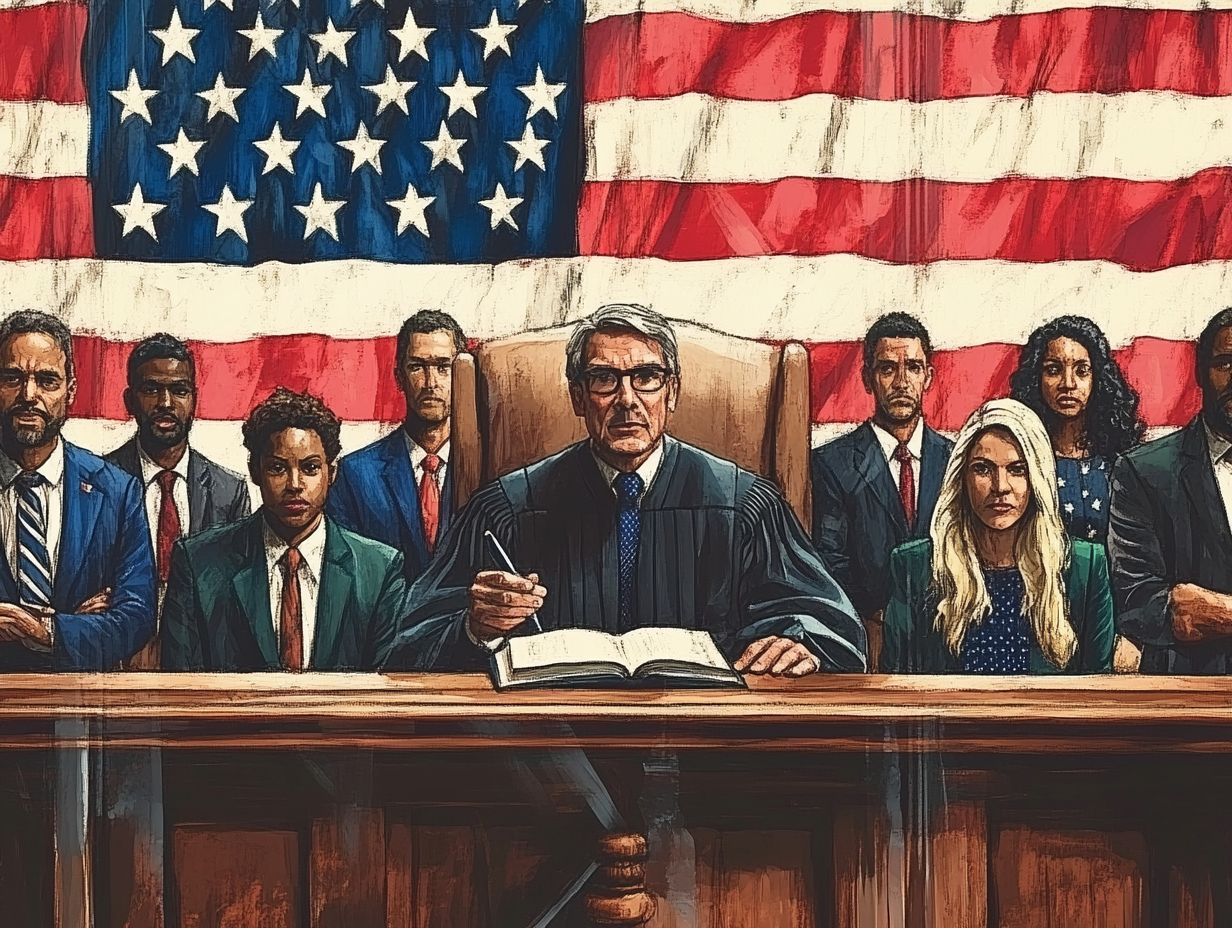
Understanding how to exercise jury nullification is essential for you as a juror. Additionally, being aware of the potential consequences of a not guilty verdict is crucial.
To understand this complex process, it s vital for you to engage in thorough deliberation and foster open discussions with your fellow jurors. Each member should feel empowered to share their views and challenge the evidence presented during the trial.
This collaborative atmosphere allows you to carefully weigh the ethical considerations of your choices. Remember, while you have the right to render a not guilty verdict based on your beliefs, such a choice can lead to serious legal repercussions for the defendant, as well as broader social consequences that may affect public trust in the legal system.
The Future of Jury Nullification
The future of jury nullification stands at a crossroads, marked by ongoing debates surrounding potential legislative changes and shifting public sentiment that could redefine its place within the justice system.
As society navigates its complex relationship with justice and morality, the implications of jury nullification are likely to evolve. This evolution may mirror changing attitudes toward government authority and individual rights.
Possible Changes and Implications for the Justice System
Possible changes to jury nullification practices could significantly impact the justice system, shaping how you and other jurors interpret and apply the law.
As public attitudes shift, you might find that a more nuanced understanding of jury nullification develops. This allows you to navigate complex moral dilemmas without the fear of punitive consequences. This could lead to a more harmonious relationship between jurors and the legal framework, empowering you to stand firm in your beliefs about fairness and justice!
By embracing these changes, the community can redefine its expectations of juries. This may elevate the legitimacy of verdicts and prompt a thorough examination of laws that disproportionately affect certain populations.
These reforms could create a fairer legal system, making your voice as a juror more powerful in the quest for justice.
Frequently Asked Questions
How does jury nullification empower jurors to protect rights?
The role of jury nullification is to allow jurors to refuse to convict a defendant who has violated a law they believe to be unjust or unconstitutional. It gives the power to the jury to nullify a law and protect the rights of the defendant.
How does jury nullification impact the legal system?
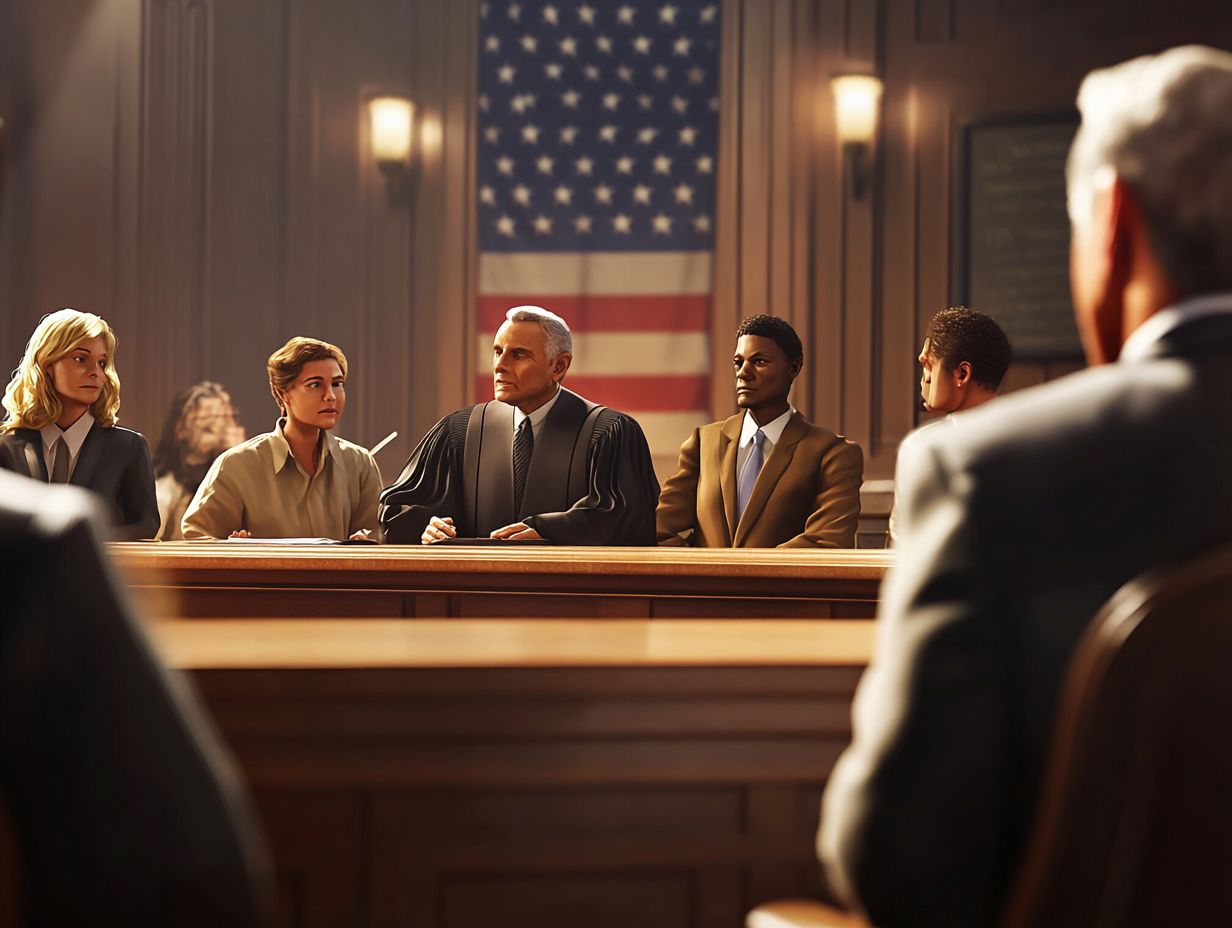
Jury nullification can significantly impact the legal system as it allows for the review and rejection of unjust laws. It serves as a check on the government’s power and promotes the protection of individual rights.
Are jurors informed about their power of nullification?
In most cases, jurors are not explicitly informed about their power of nullification. However, they have the right to use it if they believe it is necessary to ensure justice and protect individual rights.
What are the potential drawbacks of jury nullification?
One potential drawback is that jury nullification can undermine the authority of the legal system and the rule of law. It can also create inconsistency in the application of laws and lead to unequal treatment of defendants.
Can jury nullification be used in all types of cases?
While jury nullification is a power that juries possess, it is generally only used in criminal cases. It is not typically applicable in civil cases or cases involving minor offenses.
Does jury nullification protect the rights of the majority or the minority?
Jury nullification protects the rights of both the majority and the minority. It allows for the protection of individual rights and can also prevent the majority from unjustly imposing their beliefs on the minority through the legal system.
Explore these questions further to understand your role as a juror!

